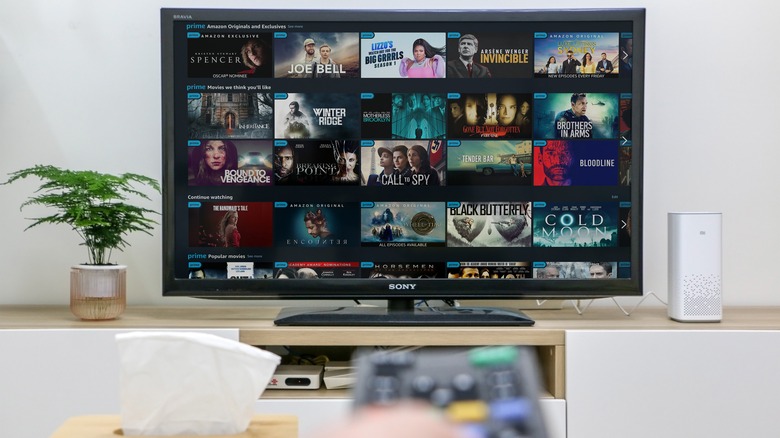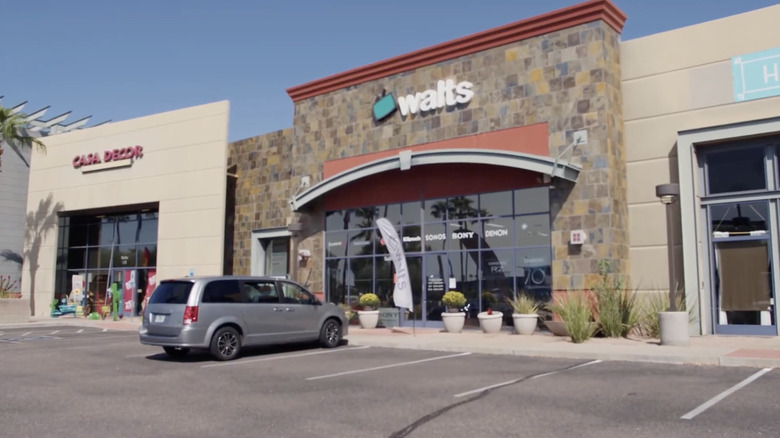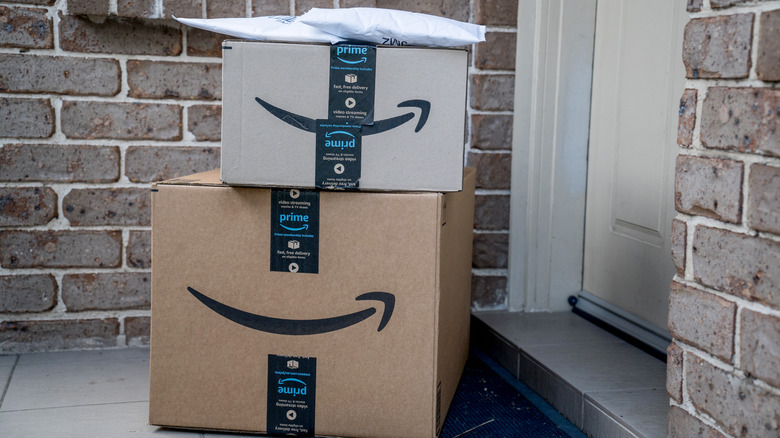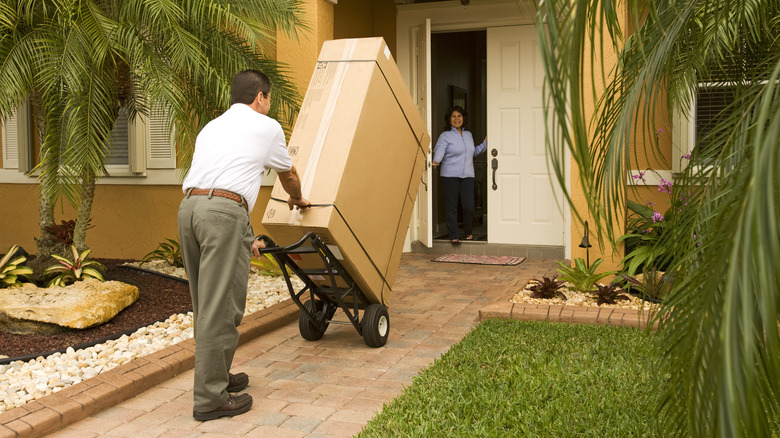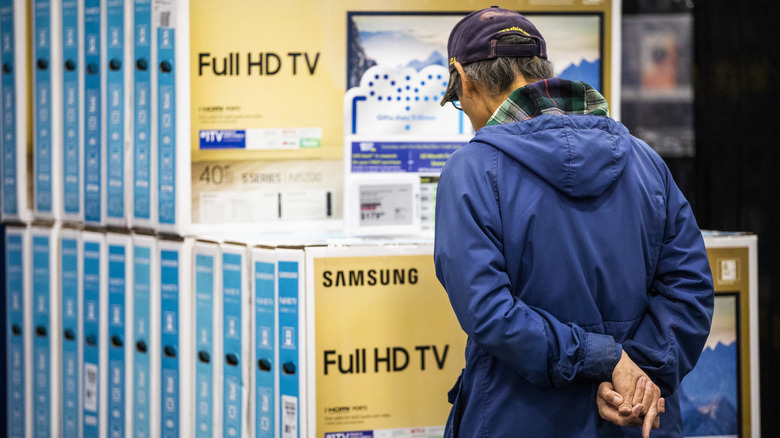The Risk You Take When Buying Certain TVs On Amazon
We may receive a commission on purchases made from links.
Originally launched as the world's largest bookstore, and eventually leveraging e-commerce to offer a sizable inventory that brick and mortar retailers couldn't come close to, Amazon.com turned into much more within a few years. That shift even supplied the title to Brad Stone's critically-acclaimed book documenting the company's history, "The Everything Store: Jeff Bezos and the Age of Amazon." The world's largest book store and its original roster of Amazon employees soon became the world's largest CD store as well. Before too long, it stopped being a media store and became, well, The Everything Store. These days, that includes all sorts of consumer electronics, some of which are made by Amazon itself, like their Kindle e-readers and Fire lines of tablets, streaming sticks, and TVs.
Amazon-branded TVs aren't the only ones they sell, though. They offer all of the top brands for prices a low as anyone offers online. What Amazon stocks and ships itself, though, is supplemented by its massive network of third-party sellers. That complicates everything when it comes to consumers hunting for the best products and deals. Many sellers are legitimate businesses, with some also doing sizable non-Amazon business and others even having their own retail stores. That ecosystem is so big, though, that scammers can also seep in. This means that you, the customer, have to be diligent about scrutinizing every detail listed for a seller if you choose to go the third party route on Amazon, especially for big ticket items like TVs. With that in mind, let's take a look at some of the factors that you should stay aware of to avoid unscrupulous TV vendors and stay safe on Amazon.
You have to scrutinize the listed seller carefully
For most new TVs on Amazon, the best deals and most visible listings are for TVs shipped and sold by Amazon proper. Those TVs are nothing to worry about, as Amazon is an authorized reseller for the major brands it carries and can be trusted to get what you were promised or rectify the situation if something goes wrong. Where it gets tricky is when you start dealing with other sellers in the Amazon ecosystem.
This doesn't just apply to outright third party sellers. In theory, you'd expect Amazon Warehouse, as an Amazon subsidiary selling repackaged Amazon returns, to be deemed an authorized reseller that's selling "open box" items similar to a store like Best Buy, complete with manufacturers' warranties being included. In practice, Amazon Warehouse is listed as a third-party seller, its items are classified as "used," and Amazon is explicit that warehouse items generally don't have warranties.
That warranty issue applies more broadly, too. Most major consumer electronics manufacturers start the warranty clock the moment that an authorized reseller sells the item, meaning that used items or those bought through middlemen often have incomplete or nonexistent warranties. Having said that, plenty of legitimate retailers with authorized reseller agreements have Amazon storefronts. That includes not just major chains like Best Buy, but also smaller specialty electronics vendors like Walts TV, Adorama, and Beach Camera. If you spot a great deal from a third-party seller, just make sure to scrutinize them and their authorized reseller status.
The return policy is different for Amazon's third-party sellers
Something else to consider is that Amazon has a completely different set of policies for third-party sellers from its famously pain-free return process for items they sell directly and third-party products that they provide fulfillment for. A TV vendor generally isn't going to spend money transporting TVs to Amazon warehouses, so if you buy a TV from a third-party seller on Amazon, they're probably fulfilling it themselves, which makes the order subject to what Amazon calls their A-to-z Guarantee.
The A-to-z Guarantee covers most common scenarios where a return would be warranted but you had difficulty getting them to comply. That includes the package not arriving, the seller not responding for 48 hours after you requested a return, the item being "damaged, defective, or not as described," an international seller not cooperating with the return policies outlined for them, the seller refusing to authorize a valid return, the seller not refunding you after a return, and the return being undeliverable. It also outlines return eligibility periods, when you're entitled to a full refund, when you're entitled to a refund of the original shipping cost, and when you're eligible for the seller covering return shipping.
Based on some of the feedback that some sellers have posted online about their frustrations with the A-to-z Guarantee, it seems like Amazon can generally be trusted to act in the customer's best interest. But it does introduce a layer of possible frustrations that wouldn't come with a TV shipped and sold by Amazon.com.
What kind of delivery service third-party sellers provide is a lot murkier
If you're ordering a TV from Amazon, TVs from third-party sellers and those shipped and sold by — or even just fulfilled by — Amazon.com have markedly different delivery experiences. If you're ordering from a third-party seller, there's usually just going to be a singular free delivery option. If you order from Amazon proper, though, then you're also given the options of having the TV delivered to "inside entryway" (defined as "the first dry area inside your residence"), the room of your choice, or even the room of your choice while also helping you unbox the TV and dispose of the packaging. (It appears that the options beyond "inside entryway" are free if the TV is shipped and sold by Amazon, but extra if the TV is just fulfilled by Amazon.)
With these specialized forms of delivery direct from Amazon, you also get the option of choosing your preferred delivery time and sometimes a three-hour delivery window. And if you don't realize until it gets there that you might have picked the wrong size TV? You might be eligible for instant returns, where the delivery drivers will just take the TV back for you and help you process the return to Amazon. Needless to say, this is a massive difference in customer experience, so if you spot a deal on a TV shipped and sold by a third-party seller, you should contact the seller to understand the full extent of how it would be delivered.
You can almost surely get the same deal elsewhere
If anything you've read by now gives you anxiety, don't worry: You don't have to shop at Amazon for a TV, no matter what deals you see. In fact, if you've read any of our TV deals posts lately, like our Spring 2024 TV deal roundup, then you may have noticed a pattern: As long as a TV is stocked by both Amazon and Best Buy, the price at both vendors tends to be identical or within a few dollars of each other. Oftentimes, other notable authorized resellers of TVs fall in line with similar pricing, as well. Suffice to say, when it comes to the most prominent offers, there isn't much of a risk of missing a great TV deal if you have an aversion to Amazon.
Even if the competitors aren't automatically trying to keep up with Amazon's pricing on a specific TV, many of them have price matching policies that you can use to match Amazon and some other competitors, regardless. Best Buy's price matching policy, for example, includes not just Amazon and local competitors, but also longtime catalog electronics retailer Abt, B&H Photo, the major warehouse club chains, specialty electronics catalog vendor Crutchfield, and more. Some of those "qualified competitors" have their own price matching policies, as well, including Abt. Generally speaking, if you see a good deal on a TV online from an authorized reseller of the brand in question, then you should be able to match it somewhere, whether locally or online. So if you'd like to avoid Amazon, you can do so without missing out on the best TV deals.
